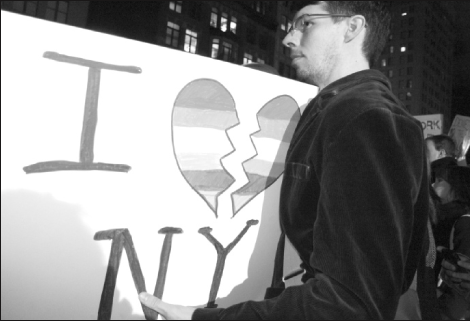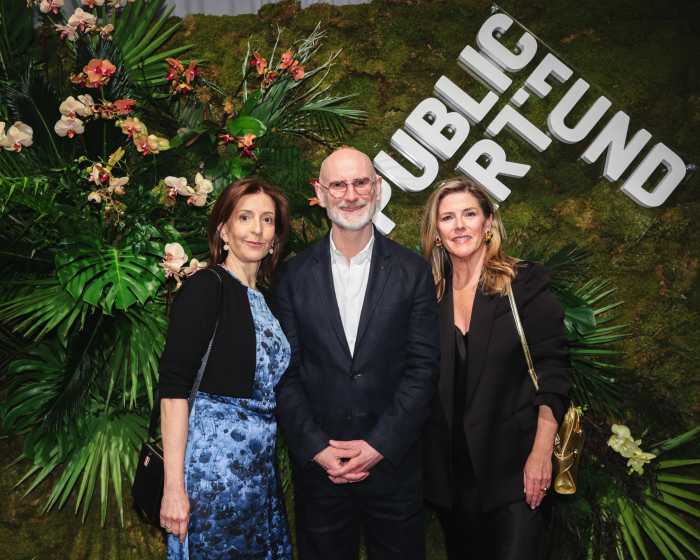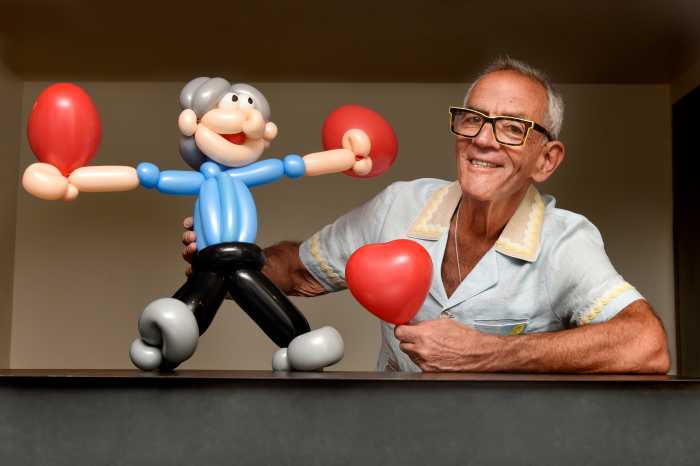By Paul Schindler
Since May, Tom Duane, the state Senate’s only openly gay member, has said he had the votes to pass the marriage-equality bill he sponsors. The Empire State Pride Agenda, the state’s L.G.B.T. lobby, has similarly voiced confidence that a bipartisan majority in the 62-member Senate would vote “yes.” In October, Governor David Paterson, who introduced the legislation that has now passed the heavily Democratic Assembly three times, referring to the Senate’s Democratic conference leader, said, “Senator [John] Sampson I’ve heard on occasion say that he thinks the bill can pass.”
But on Dec. 2, when the vote finally came up, it wasn’t even close. By a 38-to-24 margin, with no Republicans voting “yes,” the New York State Senate rejected marriage equality for same-sex couples.
There will be debate, likely even rancor, in the weeks and months ahead over what went wrong, whether the bill should have come up for a vote if it were destined to fail so decisively, and what to do next.
The immediate reaction, however, was stunned bitterness.
“I really can’t believe that they don’t think my family is as important as theirs,” said Cathy Marino-Thomas, communications director for Marriage Equality New York, as she stood up to leave the Senate gallery after the vote. “I really can’t believe that so many senators could sit there and hear all that positive feedback, look at it, and still vote against us.” With her wife, Sheila, Marino-Thomas is raising their 10-year-old daughter in Brooklyn.
Jeffrey Friedman, who is raising a 6-year-old son with Andy Zwerin in Rockville Centre, when asked his reaction, said, “Just true disappointment. I guess I’m speechless at the moment. They had a chance to do something great today and they chose not to.”
“We should be incredibly angry,” Duane — whose district includes Chelsea and Greenwich Village — told this reporter. “I’m incredibly angry. I think the community should be very, very, very, very, very angry.”
Stating emphatically, “I’m not the one who ever lied throughout this entire process,” Duane charged that at least eight of his colleagues — Democrats and Republicans — had broken promises made to him, and he said that he felt “betrayed.”
Paterson, who made the extraordinary gesture of going to the Senate floor after the vote, told this reporter, “It’s very disappointing. It’s very disheartening. Certainly, the promises that were made would have made it a much closer vote, if not a successful vote.”
Senator Kevin Parker, a Brooklyn Democrat, said of those he believed had walked out on their commitments: “I’m profoundly disappointed and sad about the outcome, partly because many of us were given assurances that we had support from colleagues on both sides of the aisle who said they would vote for this today and did not. I think this is the worst case of political cowardice that I’ve ever seen.”
Other Democrats supporting marriage equality focused on the lack of a single G.O.P. vote in favor of the bill.
“Nobody on the Republican side believed this was the right thing to do — or did they not vote their conscience?” asked Senator Liz Krueger, who represents the East Side. She was alluding to a commitment made months ago by Minority Leader Dean Skelos of Long Island to allow his members freedom in coming to their position on the legislation.
Jeff Cook, legislative adviser to the Log Cabin Republicans organization, challenged that analysis, arguing essentially the reverse.
“Unfortunately, the Democratic leadership promised to get us to a level where Republican support could put us over the top, and we just didn’t get there today,” he told this reporter.
Bronx Democrat Ruben Diaz, a Pentecostal minister, was the only senator who spoke against the bill during the floor debate — leaving the question of what motivated the other 37 “no” votes wide open.
If, in fact, some Republicans were taking a serious look at the legislation, it may have been the Democrats’ inability to muster more than 24 votes that led the G.O.P., after a bruising year in which control of the Senate changed party hands several times, to retreat from Skelos’s earlier commitment.
Certainly, Alan Van Capelle, ESPA executive director, saved his strongest fire for a Democrat — freshman Senator Joseph Addabbo of Queens.
“I think, if there is disappointment in a real big way, I think I’m very disappointed in Joe Addabbo,” he said. “I think Joe Addabbo is better than his vote.”
Addabbo supported gay rights on the City Council and claimed an open mind on marriage equality in last fall’s campaign.
One defection was Queens freshman Democrat Hiram Monserrate. Monserrate, in his years on the City Council since 2001, was a vocal supporter of the L.G.B.T. community, and prior to his election to the Senate was on the record supporting equal marriage rights. On Dec. 4, Monserrate — who faces an election challenge next year — was sentenced to three years probation in connection with an assault on his girlfriend.
Among the 18 Democrats who spoke about their support for the bill on the Senate floor, there was a consistent effort to emphasize that religious freedom was not at stake in passing the measure, and that marriage equality fit into the broader sweep of civil rights advances.
“I have religious beliefs, but when I walk through those doors, my Bible stays out,” African-American Senator Eric Adams of Brooklyn said. “You don’t have to be gay to respect that two people who meet and fall in love deserve to be married. You don’t have to be black to understand the pain of slavery.”
Jeffrey Klein of the Bronx talked about how his grandmother, who lost her entire family in the Holocaust, welcomed a young man into Klein’s family in New York after he was disowned by his own for being gay.
“‘I saw hatred,’” Klein recalled her saying. “‘He deserves to have somebody. He’s a good catch.’”
Daniel Squadron, elected last year to represent Lower Manhattan and portions of Brooklyn, said his own recent marriage “has only added to my personal sense of responsibility” for delivering equal rights to gay and lesbian couples. The separation of civil law and religious belief, he said, enhances the quality of religious life in the U.S.
Krueger said her family came to America “to escape pogroms…because this is the country that guarantees religious freedom.”
Bill Perkins, a Harlem Democrat, reiterated the civil rights thread of the debate, saying, “I can see Dr. Martin Luther King smiling down on us today.”
In closing remarks in which he seemed to struggle to contain and convey the personal significance of the marriage-equality question in his own life, Duane lamented what he said was the all-too-common view among legislators dealing with the state’s fiscal morass that “the time is never right for civil rights.” He added, “The paradox is that it’s always the right time to be on the right side of history.”
Diaz, for his part, closed by contradicting the argument that Adams of Brooklyn made, saying, “The Bible should never be left out.”
But that wasn’t the point of the day, according to Marty Rouse, national field director for the Human Rights Campaign, the Washington-based L.G.B.T. lobby.
“This vote was not about religion, it was not about morality,” he said. “For a lot of people, especially those who were silent during the debate, it was all about politics. We need to play that political game smarter and more strategically, and we’re getting there, but there is still a long way to go.”
None of the advocates or elected officials would say that pushing for the vote was a mistake or that they necessarily will have to wait until after the 2010 elections to look for another bite of the apple.
“We asked for the chance to have our lives debated on the floor of the Senate and we decided that we wanted to get a road map for 2010, and we got what we wanted,” Van Capelle said, in a surprisingly upbeat spin on the day’s events. He added that it was too early to speculate on specific next steps.
Parker echoed the value even in a losing vote.
“You at least know who the enemy is,” he said.
Cook, speaking for the Log Cabins, declined to rule out another Senate vote before next November.
“We’ll see,” he said.
Asked when he would restart his colleague outreach, Duane said, “Immediately. Pressure should not decrease at all.”
In keeping with the moxie he demonstrated by coming down to the Senate after his bill was defeated, the governor said, “I’m the one who put the bill on the floor. You can blame me. I accept full responsibility. I thought this bill needed to be voted on. I thought, up or down, this is a civil rights issue whose time has come. And I would put this bill out again next week if I thought there would be a different result.”
Asked if there were any point in trying to get another Senate vote next year, Paterson, not missing a beat, responded, “Yes — winning.”
Christine Quinn, the lesbian City Council speaker who was in Albany Dec. 1 and 2 to help out in the final lobbying drive, was succinct in speaking to both the sadness and determination that labored to coexist late Wednesday afternoon.
“This is extraordinarily disappointing, no two ways about it,” she said. “And people need to be disappointed. My father is 83 years old. Hopefully, he’ll live to dance at my wedding. But I don’t know, if they don’t get to it in the next couple of years. But the only people who can ever declare us defeated is ourselves. So, we have to be disappointed, but we need to shake it off. We need to stay focused and keep people accountable.”




































